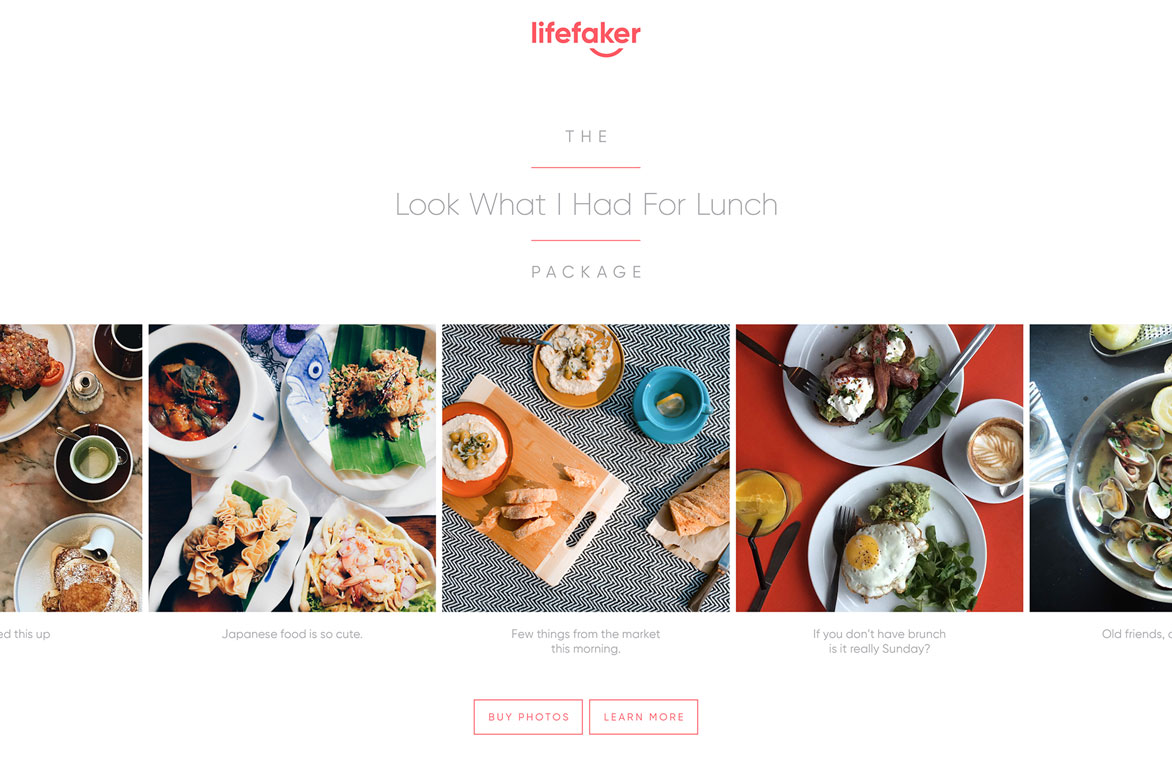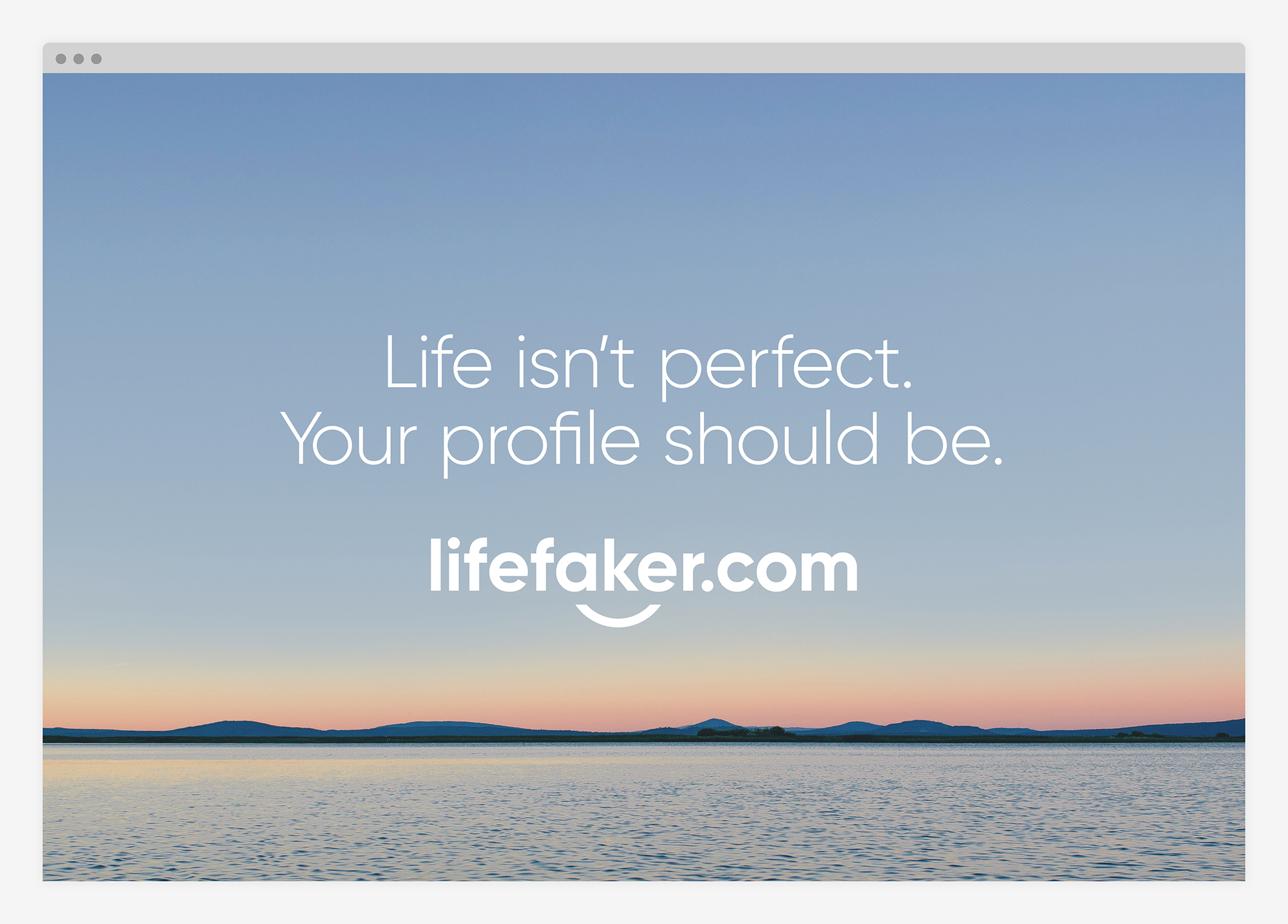Instagram is hard, isn’t it. It’s waking up to screeds of stories of the littest karaoke [triple fire emoji] the one night you stay in. It’s WhatsApping your mate to check if she gets your caption. It’s taking 36 candid selfies to get the precise one that says ‘ha ha I don’t take myself too seriously just look at this novelty mug’.
This is where Lifefaker.com steps in. They’re here to curb the onslaught of social media anxiety induced anytime you feel compelled to give your friends and/or followers a little update on your #blessed life. The premise is simple: for an extremely reasonable $1 a month, you get a selection of pre-shot, curated and captioned ‘grams that align the lifestyle you aspire to, but obviously can’t afford. Think @poundlandbandit starter packs, but nice.

Exhausted by a slew of Tinder dates with protein-swilling personal trainers? Try the ‘I’m happy by myself’ pack (books, more books, chia seed smoothies in bubble baths). 2-hour commute to work? Gloss it up with the ‘Yeah My Job Lets Me Travel’ kit (infinity pools, mini bars, cotton wool clouds framed by airplane windows). Don’t worry if you can’t turn down the free bread basket, there’s always the ‘My Unachievable Body’ lookbook (tight skin, tight abs, tighter shorts).
“Last year I fractured both my knees falling off a chair I’d stood on to take an aerial photo of my rainbow bowl,” CEO and founder Oli Frost tells us. “I was under a lot of pressure from friends at the time — all of whom made a mean guacamole and shared them on Instagram regularly. After the accident I thought about quitting social media for a while. And then I had a better idea: Lifefaker.com.”
“Though you may not exactly live the life your feed displays, you are exposing the type of lifestyle you aspire to, and doesn’t that say more about your fundamental personality than whether or not you could actually get your hands on the Balenciaga Triple S’s?”
You’re probably thinking, why pay to fake your own life when you do it for free anyway? And also maybe: there’s giving your ‘gram a glow up, then there’s downright fabricating your entire existence. Though come on, really, is it all that different? People always give Instagram crap for being fake. But, though you may not exactly live the life your feed displays, you are exposing the type of lifestyle you aspire to, and doesn’t that say more about your fundamental personality than whether or not you could actually get your hands on the Balenciaga Triple S’s? “Misleading others into believing our lives are better than they really are is what social media is all about,” Oli confirms. “All we do at Lifefaker is make it effortless and affordable.” In that way, the website is not only very useful tool, it’s a very real one too.
Except that obviously it’s not. Lifefaker’s actually a campaign by mental health awareness organisation Sanctus, whose mission is to normalise conversations around the traditionally taboo topic. Which, in a world where we spend about 94% of our days gazing at a screen, means tackling social media. “Social media is an amazing tool to connect us all,” Sanctus tells i-D, “but it’s really easy for people to chase short term dopamine hits that can affect their mental health in the long run.”
Instagram is a particularly insidious culprit. Last year it ranked as the worst social media app for young people’s mental health and wellbeing, according to a survey by the Royal Society of Public Health. Which makes sense — we’re a society that places a disproportionate amount of importance on image. You’re either scrutinising your own snaps, or comparing yourself to bodies so seemingly flawless that they’re immortalised as an actual perfume bottle. As Lifefaker states when you try and buy, say, the ‘Look At My Holiday and Cry’ package, “62% of people feel inadequate comparing their lives to others online.”
The beauty, or horror, of the campaign is that it plugs into how easily our supposedly unique selves are compartmentalised into generic subcategories of homogenised hashtags. Chances are you’ll recognise elements of yourself in them, and if not, they just haven’t created your package yet. This ease at which our online ‘personalities’ can be regurgitated by a faceless group of content creators plugging away behind thescenes is (digitally) embodied by Lil Miquela, the CGI influencer with 1.1 million followers and counting. As i-D Deputy Editor Felix Petty wrote, it’s “exciting to think of her as a way to question things about ourselves, not machine intelligence. An exercise in reflecting the emotional emptiness of influencer-society, and the shallowness of a method of communication that reduces all language to images and platitudinous one liners“.
Likewise with the Lifefaker profiles — they mirror our own compulsion to construct an often two-dimensional brand to project onto the world, or ourselves, intentionally or not. But Sanctus are quick to point out they’re not trying to take the piss. “I think most people have fallen guilty to some level of ‘Lifefaking,’” they explain. Rather, they’re highlighting the artifice of it all for two reasons. Firstly, it reinforces how easy it is to fake the ‘gram. “The more people think ‘there’s more behind that photo than it seems’, the less likely they are to compare themselves to idyllic unachievable standards,” they say. Obviously we’re all aware of filters and Facetuner, but it’s still easy to find yourself 10 metres deep in the Hadid’s flawless feeds at 2am. Secondly, they want us to question the honesty behind our own online identity. “If you don’t think you’re being truthful and you think that may be having damaging consequences on your mental health, then really question what else is going on in your life and what you’re gaining out of social media.”
“Just really grill into yourself every time you go on your phone or social media and ask yourself, ‘Why am I doing this?'”
That’s not to say Instagram is The Devil. We regularly run pieces on accounts that do quite impressive things within the constraints of the grid — from drag artists serving up alien glamour to profiles dedicated entirely to the beauty of the male bulge. It’s more about being aware, rather than consumed, by the myriad hurdles it props up, and how they affect you personally — whether it’s angsting over your own output, idealising the unattainable or falling prey to story-induced FOMO.
Obviously it’s easier said done. So what are some practical tools people can take to the battleground of the gram? “Just being mindful of your actions can be huge,” Sanctus say. “Even if it’s just for a couple hours in the evening — just really grill into yourself every time you go on your phone or social media and ask yourself, ‘Why am I doing this?'” Finally, if you can, and we know it’s hard, we really truly do: “don’t keep your phone in your room overnight. Most people lose sleep over going on social media as the last thing they do before they go to sleep and the first thing they do when they wake up. If you can keep your phone in another room — you don’t give yourself the option to lose sleep and rely even more on social media.” If that all fails, don’t fret — Lifefaker isn’t going anywhere. They’ve still got a fair share of packages in the pipeline, a couple of which we’re particularly eager to try. “‘I’ve Got A Kooky Side’, ‘Man Who Moisturises’ and ‘Even My Shoes Are Interesting’ are all on the way,” Oli says. Oh, and of course: “There’s also a ‘By The Way I Work At Vice’ package for media types looking for that extra edge.”
